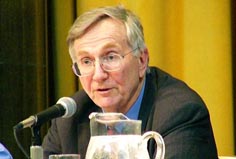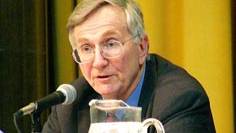Seymour Hersh on death of Osama bin Laden: ‘It’s one big lie, not one word of it is true’
Source: rawstory.com
Seymour Hersh has got some extreme ideas on how to fix journalism – close down the news bureaus of NBC and ABC, sack 90% of editors in publishing and get back to the fundamental job of journalists which, he says, is to be an outsider.It doesn’t take much to fire up Hersh, the investigative journalist who has been the nemesis of US presidents since the 1960s and who was once described by the Republican party as “the closest thing American journalism has to a terrorist”.
 He is angry about the timidity of journalists in America, their failure to challenge the White House and be an unpopular messenger of truth.
He is angry about the timidity of journalists in America, their failure to challenge the White House and be an unpopular messenger of truth.Don’t even get him started on the New York Times which, he says, spends “so much more time carrying water for Obama than I ever thought they would” – or the death of Osama bin Laden. “Nothing’s been done about that story, it’s one big lie, not one word of it is true,” he says of the dramatic US Navy Seals raid in 2011.
Hersh is writing a book about national security and has devoted a chapter to the bin Laden killing. He says a recent report put out by an “independent” Pakistani commission about life in the Abottabad compound in which Bin Laden was holed up would not stand up to scrutiny. “The Pakistanis put out a report, don’t get me going on it. Let’s put it this way, it was done with considerable American input. It’s a bullshit report,” he says hinting of revelations to come in his book.
The Obama administration lies systematically, he claims, yet none of the leviathans of American media, the TV networks or big print titles, challenge him.
“It’s pathetic, they are more than obsequious, they are afraid to pick on this guy [Obama],” he declares in an interview with the Guardian.
 “It used to be when you were in a situation when something very dramatic happened, the president and the minions around the president had control of the narrative, you would pretty much know they would do the best they could to tell the story straight. Now that doesn’t happen any more. Now they take advantage of something like that and they work out how to re-elect the president.
“It used to be when you were in a situation when something very dramatic happened, the president and the minions around the president had control of the narrative, you would pretty much know they would do the best they could to tell the story straight. Now that doesn’t happen any more. Now they take advantage of something like that and they work out how to re-elect the president.He isn’t even sure if the recent revelations about the depth and breadth of surveillance by the National Security Agency will have a lasting effect.
[...]
Hersh returns to US president Barack Obama. He has said before that the confidence of the US press to challenge the US government collapsed post 9/11, but he is adamant that Obama is worse than Bush.
“Do you think Obama’s been judged by any rational standards? Has Guantanamo closed? Is a war over? Is anyone paying any attention to Iraq? Is he seriously talking about going into Syria? We are not doing so well in the 80 wars we are in right now, what the hell does he want to go into another one for. What’s going on [with journalists]?” he asks.
He says investigative journalism in the US is being killed by the crisis of confidence, lack of resources and a misguided notion of what the job entails.
“Too much of it seems to me is looking for prizes. It’s journalism looking for the Pulitzer Prize,” he adds. “It’s a packaged journalism, so you pick a target like – I don’t mean to diminish because anyone who does it works hard – but are railway crossings safe and stuff like that, that’s a serious issue but there are other issues too.
“Like killing people, how does [Obama] get away with the drone programme, why aren’t we doing more? How does he justify it? What’s the intelligence? Why don’t we find out how good or bad this policy is? Why do newspapers constantly cite the two or three groups that monitor drone killings. Why don’t we do our own work?
“Our job is to find out ourselves, our job is not just to say – here’s a debate’ our job is to go beyond the debate and find out who’s right and who’s wrong about issues. That doesn’t happen enough. It costs money, it costs time, it jeopardises, it raises risks. There are some people – the New York Times still has investigative journalists but they do much more of carrying water for the president than I ever thought they would … it’s like you don’t dare be an outsider any more.”
He says in some ways President George Bush’s administration was easier to write about. “The Bush era, I felt it was much easier to be critical than it is [of] Obama. Much more difficult in the Obama era,” he said.
[...]
“The republic’s in trouble, we lie about everything, lying has become the staple.” And he implores journalists to do something about it.
Read the full article at: rawstory.com






















